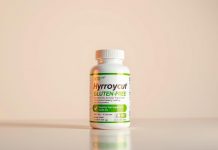Are you on a gluten-free diet and looking for ways to enhance your weight loss journey? Look no further! In this article, we will explore the world of gluten-free diet pills and provide you with valuable insights on how to find the best ones for your needs. Whether you are seeking to shed a few pounds or simply maintain a healthy lifestyle, we have got you covered. Say goodbye to the frustrations of searching for gluten-free options and say hello to a convenient and effective solution – gluten-free diet pills. Get ready to embark on your journey to a healthier you!
Table of Contents
Understanding Gluten-Free Diet Pills
What are Gluten-Free Diet Pills?
Gluten-free diet pills are dietary supplements designed to support weight loss efforts for individuals who follow a gluten-free diet. These pills are specifically formulated to be free of gluten, which is a protein found in wheat, barley, and rye. For individuals with celiac disease or gluten sensitivity, consuming gluten can lead to various digestive issues and other health problems. Gluten-free diet pills are an alternative for those seeking weight loss solutions while maintaining a gluten-free lifestyle.
How do Gluten-Free Diet Pills Work?
Gluten-free diet pills work by utilizing a combination of ingredients that aim to support weight loss. These ingredients can include natural extracts, vitamins, minerals, and other substances known to have potential weight loss benefits. By taking these pills as directed, they may help boost metabolism, suppress appetite, increase energy levels, and enhance fat burning. However, it’s important to note that the effectiveness of diet pills can vary from person to person, and they should be used in conjunction with a healthy diet and regular exercise.
Are Gluten-Free Diet Pills Effective?
The effectiveness of gluten-free diet pills can vary among individuals. While these pills may provide some support to weight loss efforts, they are not magical solutions that guarantee instant results. It is essential to have realistic expectations and understand that sustainable weight loss requires a comprehensive approach that includes a balanced diet, regular exercise, and lifestyle changes. Consulting a healthcare professional before starting any weight loss regimen is highly recommended to determine the most suitable options for one’s individual needs.
Identifying Your Needs
Consulting a Healthcare Professional
Before incorporating gluten-free diet pills into your weight loss journey, it is crucial to consult a healthcare professional. They can assess your overall health, medical history, and any potential interactions with medications you may be taking. A healthcare professional can provide personalized advice and recommendations based on your unique circumstances, ensuring that you approach weight loss safely and effectively.
Determining Your Weight Loss Goals
Understanding your weight loss goals is important when considering gluten-free diet pills. Take some time to determine the amount of weight you want to lose and set realistic and achievable targets. This will help you choose the right type of diet pill and track your progress effectively. Keep in mind that gradual and sustainable weight loss is generally more beneficial than rapid weight loss, as it is more likely to be maintained in the long term.
Considering Any Allergies or Sensitivities
When assessing your needs for gluten-free diet pills, it is essential to consider any allergies or sensitivities you may have. While these pills are gluten-free, they may contain other ingredients that could trigger allergic reactions or sensitivities. Carefully read the ingredients list and consult with a healthcare professional if you have any concerns or known allergies. It is vital to prioritize your safety and well-being when selecting any dietary supplements.

Researching Ingredients
Identifying Common Gluten-Free Ingredients
To make an informed decision about gluten-free diet pills, it is beneficial to familiarize yourself with common gluten-free ingredients. Some of these ingredients include green tea extract, Garcinia Cambogia, raspberry ketones, African mango extract, and conjugated linoleic acid (CLA). These ingredients have been used in various weight loss supplements and may have potential benefits when incorporated into a weight loss plan. Understanding these ingredients will help you determine which products may be best suited for your needs.
Evaluating the Safety and Efficacy of Ingredients
When researching ingredients, it is crucial to evaluate their safety and efficacy. Look for scientific studies and research that supports claims made about the ingredients’ weight loss benefits. Be cautious of exaggerated claims or unsupported marketing statements. Additionally, consider any potential side effects associated with the ingredients. Independent reviews and reputable sources can provide valuable insights into the safety and efficacy of various ingredients commonly found in gluten-free diet pills.
Understanding the Role of Each Ingredient
Each ingredient found in gluten-free diet pills plays a specific role in supporting weight loss. Green tea extract, for example, is known for its metabolism-boosting properties and potential fat-burning effects. Garcinia Cambogia is believed to aid in appetite suppression. Raspberry ketones may contribute to increased fat oxidation. By understanding the role that each ingredient plays, you can select diet pills that align with your weight loss goals and preferences.
Choosing a Reputable Brand
Seeking Certified Gluten-Free Products
When choosing gluten-free diet pills, it is essential to seek out brands that offer certified gluten-free products. Look for certifications from reputable organizations that test and verify gluten-free claims on products. These certifications provide reassurance that the pills have undergone rigorous testing to ensure that they are indeed gluten-free. Some reputable certifications to look for include the Gluten-Free Certification Organization (GFCO) and the National Celiac Association’s Gluten-Free Certification Program.
Checking for Third-Party Testing and Verification
Alongside gluten-free certifications, it is important to check if the brand conducts third-party testing and verification. Third-party testing ensures that the product is accurately labeled and meets quality standards. This process provides an extra layer of assurance that the gluten-free diet pills are safe and effective. Look for information on the brand’s website or packaging that indicates third-party testing has been conducted.
Reading Customer Reviews and Feedback
Customer reviews and feedback can offer valuable insights into the effectiveness and experiences of individuals who have used certain gluten-free diet pills. Take the time to read reviews from reputable sources and platforms to gain a better understanding of real-life experiences with the product. Consider both positive and negative reviews, and look for trends or common experiences that may impact your decision-making process.

Understanding Labeling and Certifications
Certifications to Look for
When assessing gluten-free diet pills, it is essential to understand the different certifications related to dietary supplements. In addition to gluten-free certifications, other relevant certifications might include Good Manufacturing Practices (GMP) certification or NSF International certification. These additional certifications indicate that the product has undergone quality testing and meets industry standards for safety and effectiveness.
Verifying the Gluten-Free Claim
Labeling and claims made on the packaging of gluten-free diet pills are essential to understand. Look for clear and concise gluten-free labels that comply with industry regulations and certifications. Additionally, cross-check the product ingredients with reputable sources to ensure that there are no hidden sources of gluten. When in doubt, consult a healthcare professional or contact the manufacturer for clarification.
Recognizing Other Relevant Certifications
Aside from gluten-free certifications, there may be other relevant certifications to consider. For example, organic certifications, such as the USDA Organic seal, indicate that the product is made from ingredients grown without the use of pesticides or synthetic fertilizers. Non-GMO Project Verified certification assures that the product does not contain genetically modified organisms. By recognizing these additional certifications, you can align your values and preferences with your choice of gluten-free diet pills.
Considering Additional Health Benefits
Exploring Additional Ingredients with Health Benefits
In addition to supporting weight loss goals, some gluten-free diet pills may include ingredients that offer additional health benefits. Ingredients like vitamins, minerals, and antioxidants can provide extra nutritional support, promoting overall wellness during the weight loss journey. Consider your personal health needs and preferences when selecting diet pills with additional health benefits.
Identifying Personal Health Needs
Everyone’s health needs are unique, and it is important to consider personal factors when choosing gluten-free diet pills. For example, individuals with specific dietary concerns may prioritize products that are vegetarian, vegan, or free from allergens other than gluten. Additionally, individuals with pre-existing medical conditions or those taking medications should seek advice from a healthcare professional before starting any new dietary supplement.
Understanding Potential Interactions with Medications
Certain supplements and medications may interact with each other and potentially affect their effectiveness or cause adverse reactions. It is crucial to understand any potential interactions between the gluten-free diet pills and any medications you are currently taking. Consulting with a healthcare professional will provide clarity regarding these potential interactions and help you make informed decisions about the compatibility of different supplements and medications.

Assessing Potential Side Effects
Examining Possible Side Effects and Risks
Just like any dietary supplement, gluten-free diet pills may come with potential side effects and risks. Common side effects may include stomach discomfort, nausea, headaches, or jitteriness. It is important to be aware of these possibilities and assess your tolerance and sensitivity to various ingredients. Knowing potential side effects will help you determine if the benefits outweigh the risks and make an informed decision.
Determining Tolerance and Sensitivities
Consider your personal tolerance and sensitivities when assessing potential side effects. If you have a known sensitivity to certain ingredients or have experienced adverse reactions in the past, it may be necessary to avoid products that contain those ingredients. It is always recommended to proceed cautiously and listen to your body to ensure optimal safety and well-being.
Avoiding Ingredients that Trigger Allergic Reactions
Individuals with known allergies should carefully examine the ingredient lists of gluten-free diet pills to avoid any potential triggers. Common allergens to watch out for include soy, dairy, nuts, and shellfish. If you have severe allergies or are uncertain about certain ingredients, consult a healthcare professional or allergist to ensure that the diet pills you choose are safe for consumption and will not cause an allergic reaction.
Budgeting for Gluten-Free Diet Pills
Comparing Prices and Value for Money
When budgeting for gluten-free diet pills, it is important to compare prices across different brands and products. Consider the quantity provided in each package, as well as the recommended dosage. Calculate the cost per serving to determine the value for money offered by each option. Keep in mind that the most expensive product may not always be the most effective, so it is essential to consider factors beyond price alone.
Understanding the Cost of Gluten-Free Products
Gluten-free products, including diet pills, may be slightly more expensive than their gluten-containing counterparts. The additional costs associated with sourcing gluten-free ingredients and ensuring a gluten-free manufacturing process can contribute to the higher price point. While it may be tempting to opt for cheaper alternatives, prioritize the quality and safety of the product to support your weight loss journey effectively.
Considering Long-term Costs
When budgeting for gluten-free diet pills, it is vital to consider the long-term costs. Sustainable weight loss is a journey that extends beyond a short-term fix, and maintaining a healthy lifestyle may require ongoing use of supplements. Factor in the potential need for continuous use and budget accordingly to ensure you have a realistic financial plan in place.
Creating a Personalized Diet and Exercise Plan
Combining Diet Pills with a Balanced Diet
Gluten-free diet pills should complement a balanced and nutritious diet. While they may help support weight loss efforts, relying solely on diet pills without a healthy eating plan is not recommended. Incorporate a variety of whole foods, including fruits, vegetables, lean proteins, and whole grains, while monitoring portion sizes. Consider consulting a registered dietitian to create a personalized meal plan that aligns with your weight loss goals and dietary preferences.
Incorporating Regular Exercise
Physical activity is a crucial component of any weight loss plan. In addition to supporting weight loss, exercise offers numerous health benefits, including increased cardiovascular fitness, improved mood, and enhanced metabolic function. Consult with a healthcare professional or a certified fitness trainer to determine the most appropriate exercise routine for your individual needs and fitness level. Remember to start gradually and listen to your body to avoid injuries.
Monitoring Progress and Making Adjustments
Regularly monitoring your progress is essential to evaluate the effectiveness of your personalized plan, including the use of gluten-free diet pills. Use a combination of methods to track your progress, such as measuring body weight, body measurements, and overall wellness indicators. If you are not seeing the desired results, consider making adjustments to your diet and exercise plan. Be patient, as sustainable weight loss takes time, and adjusting your approach may be necessary to achieve your goals.
Consulting with a Healthcare Professional
Seeking Professional Advice Before Starting a New Supplement
Before starting any new dietary supplement, including gluten-free diet pills, it is important to seek professional advice from a healthcare professional. They can provide guidance based on your individual health needs, medical history, and potential interactions with medications. A healthcare professional can help you navigate through the vast array of weight loss supplements available and recommend the most suitable options for your specific circumstances.
Discussing Personal Health Conditions
During your consultation with a healthcare professional, it is important to discuss any personal health conditions you may have. Certain health conditions can impact the effectiveness or safety of gluten-free diet pills. Conditions such as diabetes, high blood pressure, or thyroid disorders may require specific considerations when selecting dietary supplements. Openly communicating with your healthcare professional will help ensure that your weight loss efforts align with your overall health needs.
Getting Recommendations for Gluten-Free Diet Pills
A healthcare professional can provide valuable recommendations for gluten-free diet pills. They are knowledgeable about the latest research, safety concerns, and the efficacy of various supplements. Based on your goals, preferences, and health history, they can suggest specific brands or ingredients to consider. Healthcare professionals can also monitor your progress and make adjustments as needed, providing ongoing support throughout your weight loss journey.














